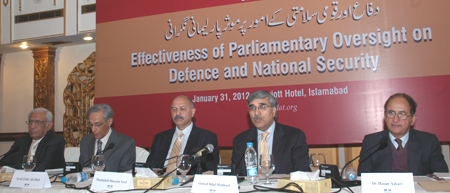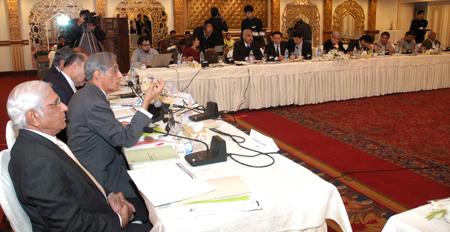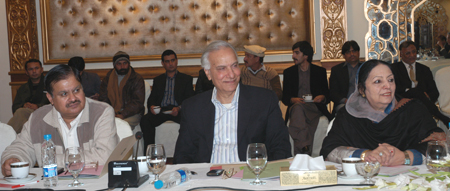|
|
| |
| EVENTS |
|
|
> Democratic Oversight of Defence remains fraught with Challenges: Experts
|
|
|
|
| |
January 31: Parliament has taken some strides towards establishing Parliamentary oversight on defence in Pakistan, however overall democratic control on defence remains weak and fraught with challenges. |
|
| |
In a Discussion Forum by PILDAT over the Effectiveness of Parliamentary Oversight on Defence and National Security, held to take stock of the status of Parliamentary oversight on defence over the past 4 years, panelists believed that Parliament has inched towards this objective aided by citizens and media.
|
|
| |
Syed Zafar Ali Shah, MNA, Mr. M. Ziauddin, senior Journalist, Dr. Hasan-Askari Rizvi, Defence Analyst and Mr. Mushahid Hussain Sayed, former Senator and Federal Minister, were speakers at the Forum. Key discussants included members of PILDAT Dialogue Group on Civil-Military Relations Mr. Tasneem Noorani, former Federal Secretary, Lt. Gen. (Retd.) Talat Masood and Air Vice-Marshall (Retd.) Shahzad Choudhry, former Ambassador of Pakistan. Members of Parliament, analysts and media also joined the Forum. |
|
| |
�No military coup can take place in Pakistan now,� echoed panelists, not because civil government has provided a credible alternative to military rule but because Pakistan can not now be governed through a centrist force. |
|
| |
Chair of the Forum, Mr. Mushahid Hussain Sayed credited PILDAT for providing regular avenues to broaden public debate on the crucial issues of civil-military relations. Pakistan has seen a transformation in which society has become more vibrant and stronger while the government is weak. We are moving towards adopting �rules of the game� in which everyone remains within their ambits, he said. The military has to deal with the issue of terrorism also. Despite the crisis of Memogate, there has been no voice supporting a military rule. The way forward, however, is to improve governance in Pakistan. |
|
| |
Dr. Hasan-Askari Rizvi, Defence and Political Analyst, said that the relationship of the military with the Parliament has changed relatively. The Public Accounts Committee has done a lot of work pertaining to military forces which the military is not comfortable with. Parliament is getting stronger but it will only become relevant in Pakistan�s politics when political leadership makes Parliament the forum for decision-making and resolution of crises. He said theoretically the coup can take place at any time but pragmatically it is not a possibility as Pakistan has become ungovernable by the Military. Eighty percent problems of governance are structural. Military needs political support for fighting insurgency which is only being provided by the government coalition parties while the opposition, including the PML-N is ambivalent about it. Since after the 18th Amendment, the Judiciary cannot validate a coup which rules out any chances of intervention. It remains to be seen how the Supreme Court will take up issues relating to the military and whether the Court will treat the military just as it has been treating the Civil Government, he said. |
|
| |
Mr. Muhammad Ziauddin, Senior Journalist, said that an inevitable turf war has ensued between the army and the civilian government. Transitions from a closed system (military regime) to a civilian dispensation ( an open system, no matter how fledgling) are always prone to accidents. He said that the May 13 in-camera briefing to joint parliamentary session in one sense was a watershed. But on many counts it was business as usual. The Parliament, instead of holding Military to account and ask probing questions about attack on GHQ and on Mehran base, etc., just played to the tune of the military as is evident from the Joint Statement issued at the end that only condemns the US. |
|
| |
Syed Zafar Ali Shah, Member National Assembly (NA-212, Naushero Feroz � II, Sindh), said that governance needs to improve in Pakistan. Parliament has taken some important steps to move towards oversight on defence but there is a long journey ahead. Until Parliament is taken seriously by the rulers, it will remain a weak forum to exercise its sovereignty.
Initiating the discussion, Lt. General (Retd.) Talat Masood said that no coup is possible in the country today and the media should refrain from �sensationalising� its prospects at the time of any stress in civil-military relations. Parliament needs to be strengthened in order to exercise its powers. The Defence Committee of Cabinet should have a fulltime secretariat and a think tank and it should meet regularly, as opposed to just after a crisis. The civilian governments need to improve their performance.
Air Vice-Marshall (Retd.) Shahzad Choudhry, said that the �civil� in civil-military relations pertains to only the Parliament and the Government which have a right to oversee and control the defence. In order to establish civil, democratic oversight, the institution of the military should not be weakened. It is important to create the capacity in the civilian side. Defence budget is as comprehensive as any other division or ministry�s budget but it is the Parliament which needs to build its capacity to probe the defence budget. |
|
| |
Mr. Tasneem Noorani, former Federal Secretary of Interior, said that throughout this Government�s tenure, civilian government has abdicated its right and responsibility to initiate or lead on defence and security policy of Pakistan. Military is a part and product of the same society and it respects any competent civilian even if that is just a competent civil bureaucrat. The capacity to provide good governance is lacking in this set-up which is why the moral authority to exercise control and oversight has not taken root. Democratic and parliamentary oversight should be established but through a measured, step by step approach.
Mr. Naseer Bhutta (NA-127, Lahore-X), MNA from PML-N, said that such sessions by PILDAT are important steps towards capacity building of MPs. PILDAT has opened up debate on a hitherto �taboo� issue of civil-military relations in Pakistan which is a praise-worthy step. He said that the PML-N went to Court on the memo issue with the plea to bring facts to light and it stands by that plea.
Mr. Muhammad Baleegh-ur-Rehman, (NA-185 Bahawalpur-III, Punjab) MNA from PML-N, said that the argument that military intervenes because civilian governments do not deliver is a very flawed argument that is at the heart of the civil-military imbalance in Pakistan. Democratic governments mis-perform and are voted out elsewhere also but its not militaries of developed democracies that boot them out. Unless this paradigm change in thinking takes place, we remain vulnerable. He said that all Pakistanis want a professional, capable, best-equipped and invincible Armed Forces but it is the �political� role of Armed Forces which is detrimental.
Lady MNAs from PML-N, Ms. Qudsia Arshad, MNA Ms. Parveen Masood bhatti, MNA believed that politicians need to provide good governance to the people. Ms. Qudsia Arshad advocated that military is a national institution and it will intervene and overthrow any civilian government if it is a threat to the national security of Pakistan.
Mr. Matiullah Jan, Journalist Dawn News, said that before analyzing Parliamentary oversight on defence, it is important to establish whether the Executive, under whose direct control Armed Forces operate, has managed to establish any control over the Military. He believed it is the civil Government which has not managed to exercise any control over the Military, analyzing that the Military has not �submitted� itself to any democratic control.
Mr. Abdul Qadir, from Friedrich Ebert Stiftung, said that Parliament has ensured that through the 18th Amendment to the Constitution, Pakistan can not be governed from the Centre alone without the provinces. This, in his view, is the biggest hurdle to any military rule in Pakistan.
Initiating the Forum, Mr. Ahmed Bilal Mehboob, Executive Director PILDAT, said that Pakistan continues to face serious strains in civil-military relations. PILDAT believes that while there should be a Constitutional balance of civil-military relations in Pakistan, and it continues to make its modest efforts in this regard, the dialogue on civil-military relations is not centred on weakening any unit or arm of the state in order to achieve this. Improving civil-military relations in Pakistan and Parliamentary oversight of defence in Pakistan have been major areas of focus of PILDAT over the years. We have prepared and disseminated a large body of work relating to this subject both to the Parliament and the media. Discussing the objective behind the forum, Mr. Mehboob said that since after 2008 General Election, within the 4 Parliamentary years, there have been two specific joint sessions of the Parliament in which Pakistan Military has briefed the Parliament, first on National Security issues and later on the May 2 unilateral strike of USA into Pakistan. This forum is facilitated by PILDAT to explore whether these briefings, held on October 08, 2008 and on May 13-14, 2011 helped further Parliament�s quest for oversight on defence in Pakistan. He especially thanked Syed Zafar Ali Shah, MNA and Mr. Muhammad Ziauddin, Senior Journalist, for writing two issue papers for background of the forum.
3 publications by PILDAT were shared with participants at the forum which included:
- PILDAT Report: Comparative Analysis of Election Manifestoes: PPP, PML-N and PT
[ Download Urdu Version (PDF) ]
-
Parliament�s Quest for Oversight on Defence in Pakistan authored by Mr. Muhammad Ziauddin, Senior Journalist
- Effectiveness of Parliamentary Oversight on Defence and National Security Sector in Pakistan authored by Syed Zafar Ali Shah, MNA
|
|
| |
|
|
| |

|
|
| |
|
|
| |

|
|
| |
|
|
| |

|
|
|
|
|
|
|
|
|